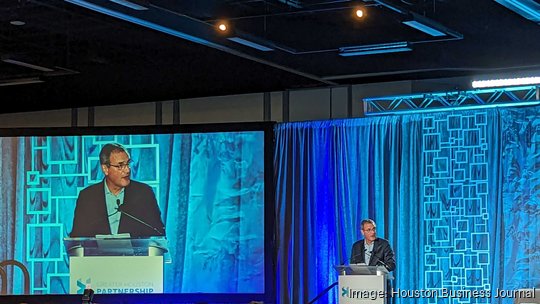
Industries across Houston are making strides for the future, and the Bayou City’s aerospace sector is not getting left behind, local leaders said.
During the Greater Houston Partnership’s Future of Space 2023 event this week, Vanessa Wyche, director of NASA’s Johnson Space Center in Houston; Mario Diaz, director of the Houston Airport System; and Nancy Currie-Gregg, a former astronaut and current professor of practice at Texas A&M University, joined GHP President and CEO Bob Harvey for a panel discussion on the recent moves Houston has made in 2023.
Harvey, who is less than a month away from his retirement as the GHP’s top executive, led the discussion off by highlighting significant funding from the Texas Legislature. During the 88th legislative session, House Bill 3447 created the Texas Space Commission, intended to keep the Lone Star State competitive with other emerging space markets around the country.
From that bill, $350 million — over 56% of its total funding, according to Harvey — went to the Houston area, where Texas A&M University will use the funds to create a new $200 million Texas Space Institute facility near the JSC.
Currie-Gregg, who flew on four Space Shuttle missions for NASA, said the institute was a symbol of collaboration within the aerospace industry that she did not experience as an astronaut.
“Not only do we need the engineering talent [from] around the world, but we need collaborations to really be able to fund the varying goals that we all have in space,” Currie-Gregg said.
Currie-Gregg and Wyche also emphasized the role Houston needs to play in developing its own workforce. Texas A&M’s facility is expected to include labs, shops, classrooms, meeting rooms, control rooms, dedicated spaces for astromaterial curation and sample research, and two large extraterrestrial testbeds when completed.
NASA has also made inroads with other Houston organizations fostering talent and technology. Last year, the agency initiated a tech transfer program with the Ion, allowing local startups to partner with NASA.
Spaceport taking shape as Houston learns lessons to attract companies
The panel followed recent developments at the Houston Spaceport, where some of the Bayou City’s most prominent aerospace companies are building out infrastructure. Most recently, Intuitive Machines Inc. (Nasdaq: LUNR) opened a $40 million production center in late September and began shipping its lunar landers to Florida ahead of an anticipated private mission. The multiday launch window for IM-1 lunar mission is expected to open Jan. 12, 2024, the company said in late October.
Diaz said Houston picked up lessons on attracting private space companies from space ecosystems around the country, including Huntsville, Alabama. Diaz recounted Houston's loss to Huntsville in the race to bring Jeff Bezos' Blue Origin production facility as an example of where the Bayou City has improved.
"The state of Alabama gave to Blue Origin $10 million to build the plant," Diaz said. "So we got together with a couple of organizations and went hat in hand to Alabama. We said, 'OK, tell us what you did.'"
North Carolina-based Collins Aerospace, a subsidiary of RTX Corp. (NYSE: RTX), is the most prominent beneficiary of Houston’s efforts to bring companies to Houston. Collins completed a 120,000-square-foot facility at the Spaceport last year. This summer, Collins, along with Houston-based Axiom Space, landed a NASA contract to develop spacesuits for the agency’s upcoming Artemis program, which aims to have a moon landing for the first time in over 50 years.
"Collins was bursting at the seams, and they had to make a decision about expanding," Diaz said. "We made them an offer they couldn't refuse."
Axiom Space is also constructing a 22-acre Space Flight and Assembly Headquarters at the Spaceport, which the company has previously said will develop the Axiom Station — a private space station billed as a potential replacement for the International Space Station, which is set to be retired in 2030.
Axiom Space also completed a private mission earlier in 2023, and its CEO Michael Suffredini said the company would be a leader in the emerging low-Earth-orbit economy.





